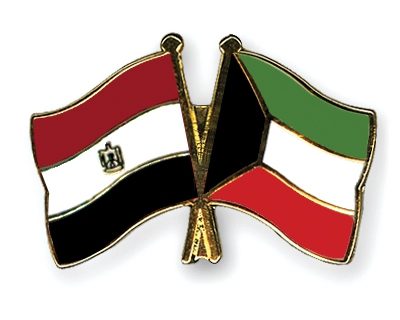
Egypt will receive crude oil from Kuwait for the next three years
Kuwait renewed a contract to supply Egypt with crude oil for the next three years, reported Bloomberg.
A senior Kuwaiti government official said that the shipments are not intended to make up for the loss of Saudi fuel shipments to the North African country.
The official, who asked to remain anonymous because the contract wasn’t announced publicly, said that Egypt will get 2 million barrels of Kuwaiti crude a month starting January 1.
He said that the contract is for three years and the supplies will be based on international prices.
The contract is an extension of the current agreement between the two countries, the official said.
Stratfor has published a report titled: “Egypt looks help where it can get it” saying that despite the recent differences between Egypt and Saudi Arabia, “two other GCC members, Kuwait and the United Arab Emirates, are continuing business as usual with Cairo, preserving the ties that bind it to the bloc. On Nov. 16, Kuwait agreed to deliver 2 million barrels of crude oil to Egypt each month starting Jan. 1, and another deal to extend its refined oil to Cairo may be forthcoming.”
Egypt’s first priority until it can stanch the flow of money is finding the financial support and fuel supplies it needs.
However, the question is: Will the Kuwaiti oil deal replace the Saudi Arabia deal with Egypt? In other words, will Kuwait compensate Egypt for its fatal loss that resulted from the Aramco decision to halt the oil supplies to Egypt?
Some experts say that the Kuwaiti stance came on time. Gamal Raif, business news director at October Weekly said, “The Kuwaiti stance came at a good time especially that Egypt announced it will not revert to Iran for oil and so one of the gulf nations had to support Egypt. By refusing Iran’s offer, Egypt showed its good will and proved that it won’t lose its political ties with the gulf nations for the sake of economic gains.”
In fact, Egypt imports nearly 2.3 million tonnes of petroleum products every month at a cost of over $800 million. This is considered a huge bill for Egypt’s wrecked economy especially after the recent devaluation of the Egyptian pound. As a result, the 2 year Kuwaiti deal is a breath of fresh air for the country’s budget, according to CCTV.
Raif said,”The most important aspects of the deal is that the shipments of
1 million barrels of oil every month will have a 2-month grace period starting next year. This will allow the government and economy enough time to pay the bills without a load on the budget.”
In the same context, Stratfor believes that even if Egypt’s straits have forced it to look beyond its traditional allies as well as signing memorandums of understanding for crude oil with producers such as Azerbaijan and Iraq. “However, these deals will not make up for the 700,000 metric tons per month of refined petroleum products that Saudi Aramco had promised, nor will they provide the strategic benefits that GCC countries can offer,” said Stratfor. “Consequently, Egypt will continue its quest for cash so that it can purchase the fuel it needs on the spot market.”
Stratfor pointed that the promise of financial relief-after receiving the IMF loan- “could embolden Cairo in its pursuit of greater foreign policy independence.” It added,” But Egypt’s economy is not out of the woods yet. As it looks to new partners for economic help, Cairo cannot afford to jeopardize the valuable relationships it already has with Saudi Arabia and the GCC. Similarly, the GCC cannot turn its back on Egypt, in whose stability the bloc’s members are all invested.”
The geopolitical center stated that the GCC countries won’t allow Egypt to fall as “Keeping Egypt stable is a cornerstone of the GCC’s security strategy. |
Over the past five years, the Gulf countries have provided a combined $30 billion in loans and aid to Cairo. The United Arab Emirates poured to Cairo a lot of that funding, “content to help Cairo so long as its policies align with Abu Dhabi’s,” said Stratfor.
In fact, the United Arab Emirates has redoubled its support for Cairo since the military coup against Egypt’s first democratically elected president Mohamed Morsi.
Stratfor said that “As Saudi Arabia’s relations with Cairo have faltered, Abu Dhabi’s have been as strong as ever. “
In fact, Stratfor contacts indicate that Abu Dhabi and Cairo may be hashing out a deal for petroleum products to tide Egypt over through the spring, though no such agreement has been announced yet.
Tensions between Cairo and Riyadh have escalated as a result of Egypt’s divergent stances in sensitive issues to Riyadh.
Egypt has voted in favor of a Russian-backed draft resolution in the UN Security Council on Syria, which was opposed by Saudi Arabia.
As a result, Egypt’s stance has angered Egypt’s major Gulf backer which condemned Egypt’s vote and described it with the” painful” stance.
After the voting, the Saudi ambassador to the UN, Abduallah al-Mouallimi said, “It was painful that the Senegalese and Malaysian stance was closer to the Arab’s consensus than the Egyptian delegation.”
He also said that he feels pity for these countries that voted for the Russian resolution, stressing that his country will continue backing the Syrian people by all means.
Two days following the voting, Saudi state-owned oil company Aramco announced halting oil product supply to Egypt.
The sudden halt triggered a scornful media campaign against Saudi Arabia, as it was seen as a political decision. On the other side, Saudi journalists and media men criticized the Egyptian regime and blamed the Kingdom for its financial generosity with the al-Sisi regime.



